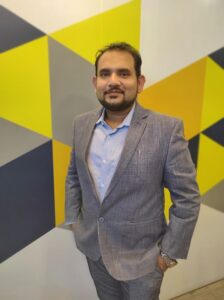Upasana Kaura
Exalta India Founder Ashutosh Verma grew up in a middle-income home where “everyone was always trying to save money from every nook and cranny”. There was a constant anxiety regarding running the AC as it would jack up the monthly electricity bill. That instilled in him a thought – why not make a solar AC.
Moving ahead in life, he enrolled for B.Tech at the University of Lucknow, and later did M.Tech from there. “My love for books and reading and logical reasoning made me a best-selling author of different books, including Startups in Solar, Consumer, and Electronics, which focuses on clean energy, cyber security fiction etc. I toiled my way up through various government and non-government jobs to understand energy solutions and save money to finally go for my entrepreneurial dream and set up Exalta India,” he says.

Ashutosh Verma, Founder, Exalta India
Exalta India has recently come up with a Portable Mini Ventilator (Oxygen Concentrator). “A third Covid wave seems inevitably near, and we need to be prepared for that. We want to be there for our community in times of need with our tech solutions. Thankfully, we were able to help people in the second wave, and we hope to do better, should the third wave hit us,” he says. Excerpts:
Tell us more about this portable mini ventilator?
It is a water-based pure oxygen concentrator that provides 1-8 litres of oxygen per minute. The usage is straightforward – one needs to put water inside the ventilator, creating pure oxygen, unlike other concentrators.
In addition, a certain amount of hydrogen is also delivered from the water and the oxygen, which makes our body alkaline, helping in increasing immunity, reduce lung mucus, and boosting alveoli.
Consumption of the oxygen created by our compact and mini ventilators has been shown to improve oxygen level, flow rate, perfusion index (PI) level, and other functions in the body in as little as 15 minutes.
This product is ideally suited to users with SPO2 levels between 90-94, but many whose levels were even around 70 have reported excellent recovery. It’s cost-effective and practically convenient, and you don’t have to depend on vendors to fill Oxygen Cylinders back and forth during any lockdown situation.
What is the cost structure? How many units have you sold till now, and which city has demanded the most?
We have two variants of 8 and 10 LPM costing 60 and 70, 000, respectively. So far, we have sold almost 2,000 devices this year. Though we get orders from across the country but the maximum are from South India, especially Bangaluru.
What are your other clean energy products?
We have products across different verticals like automobile, health, infrastructure, telecom, robotics, and aviation industry – for both B2B and B2C segments. Some our bestsellers Split and Window ACs, solar refrigerators and Two-Wheeler EVs.
How much is the demand for solar ACs and geysers?
These products are in great demand both domestically and abroad. One reason is the pandemic as growing financial instability forces people to go for economical options. Also, there is a growing awareness about being eco-friendly products. Our ACs are high-energy saving products and require less maintenance than regular AC’s, and hence much in demand among the new-age consumers. An added benefit is that they save monthly expenses since these are based on solar energy.
The high-cost structure of solar products deters people from buying these. Any plans to check that?
High-cost structures are gradually becoming cheaper with a growing market, and we are also trying to be more cost-effective. Solar products are way more affordable in terms of a long-term investment, mainly in terms of electricity unit prices. Solar-powered ACs can save 80-100 per cent of electricity and lasts for a minimum of 25 years. It is sad that people still choose Chinese manufacturers because they come cheap.
How did Exalta India come into being? What kind of funding went into it?
I started Exalta India in 2009 with an initial investment of Rs 8 lakh from Agra for research and development for AI, Robotics etc. My initial years looking for funding, talks with investors didn’t materialize into anything, which led me to start with my personal funds which were a combination of day jobs along with various side ventures.
We entered the consumer electronic industry manufacturing 10 solar ACs in 2015. Today, we produce 300-500 units in a month, besides exporting to countries like Oman, Nigeria, Afghanistan, Dubai, among others.
What sort of challenges did you face while setting up Exalta India?
When I started the company, there were many stereotypes around costly solar and clean energy products, and issues like who would repair this kind of technology, the person next door is not using it, etc. Things started changing slowly with solid backing from the government, and the idea of our environment at risk became a more sensitive subject. The fact that we could deliver good energy-efficient products slowly build customer trust. At time, we even installed the machines for free at offices of distributors and vendors, and they would pay only after witnessing the performance.
What are your future plans?
To launch more clean energy products across India with goals aligned with the government’s vision of a safer, healthier planet. We wish to make more manufacturing units and make our state-of-the-art technology on our Indian soil with helpful initiatives like Make in India and depending less on foreign companies for advanced technology. Our various agricultural products are in development for using IOT platforms, Artificial Intelligence and Robotics in agriculture. We are expanding our category of limited medical products whose components mainly include oxygen, hydrogen and nitrogen. Exalta India’s solar product industry are revamping homes, roads, hospitals, industries into using clean energy and saving 80-100% of electricity every time, and we hope to push all those horizons further.